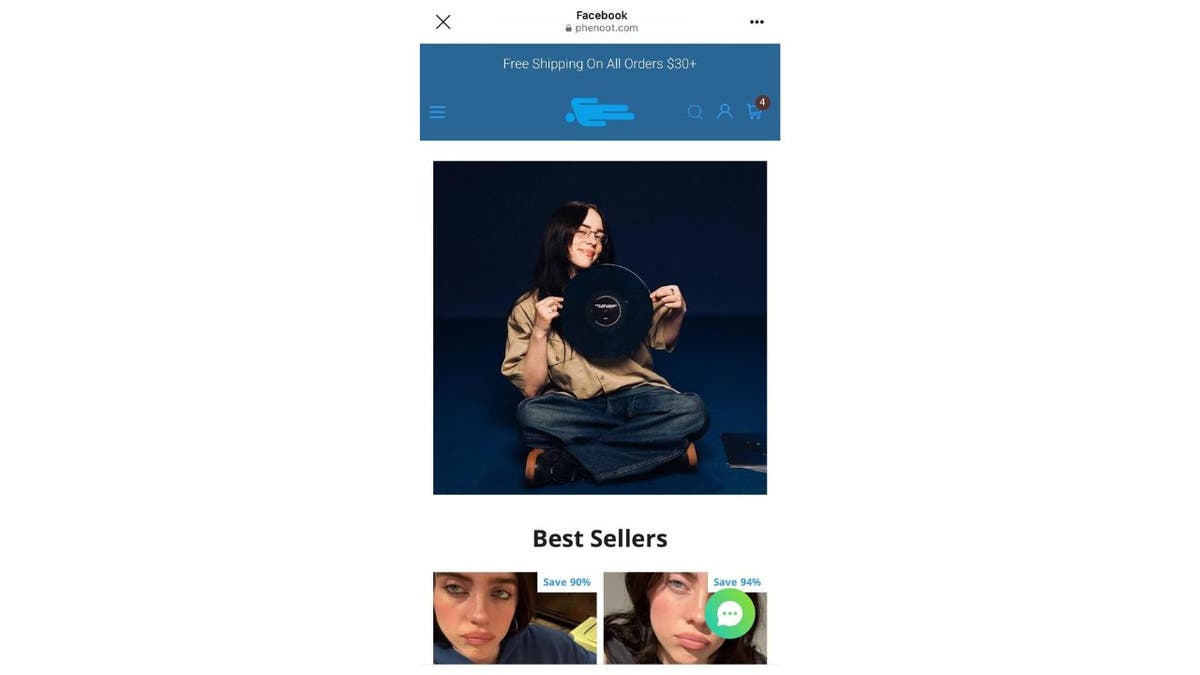NutNow you can listen to the Fox News items!
Facebook scam ads have evolved beyond the days of written buses and sketched products.
Today, many are fed by artificial intelligence, fueled by Deepfake technology and scale distributed through the Facebook ad system itself.
From false celebrities to false schemes dressed in gambling video games, the landscape of digital scams is smarter, faster and more dangerous than ever.
UNIV: Get my expert technology tips, critical security alerts and exclusive offers, as well as instantaneous access to my Free Survival Survival Guide “ When you register!
Facebook login page displayed on a laptop (Kurt “Cyberguy” Knutsson)
Don’t click this link! How to detect and prevent phishing attacks on the inbox
How did Facebook SCAM ads evolve with Ia and Deepfakes
The scammers used to trust Clickbait of low effort, but this time is over. Now sophisticated schemes are taking advantage of the content generated by AI. Technology is being used to create convincing videos of celebrities that endorse fake products or services. These ads explain that trust users are put in public figures and the perceived legitimacy of the Facebook advertising platform. These tools can mimic the appearance and voice of a person with alarming precision, which causes users to distinguish users from false. And these tools are no longer out of reach. The scammers use a combination of free AI generators and private networks to produce mass scam campaigns that seem more real than ever.
One click cost a parent $ 4 million in Bitcoin in Vishing Scammers
Real examples of Facebook scam ads using Celebrity Deepfakes
In Reddit, users have published Bizarre Screenshots Scam Ads that did so through Facebook Filters:
One presents a video generated by Kelly Clarkson’s AI promoting a suspicious cash gift. There are more than 20 accounts with variations in the name “Kelly Clarkson Live”. These ads ask users to comment on “Christmas” to receive free money, and tell them to contact a WhatsApp number to claim their prize, which is a common tactic used to harvest personal information or start payment scams.
AI Cybersecurity Risks and Deepfake scams increasing

Bizarre Facebook Screenshots Ads (Reddit)
Another uses Billie Eilish’s face to endorse a Knockoff commercial site. Design mimics standard e -commerce ads, which facilitates its fall, especially for younger fans or users.

Screenshot of Facebook’s scam ads (Reddit)
Like AI tools and scammers
These scams are not a work of solitary defrauders. These are coordinated efforts that reflect real digital marketing operations.
- Deepfake software It is used to create false celebrities’ video images.
- Voicemar clones ai Have false evaluations sounding a fantastic convincing manner.
- Text generators Find the fake reviews of the users, the threads of comments and the witnesses.
- Kits scammers With announcement templates and deployment instructions circulate in private telegram groups and discord servers.
These operations are designed to seem legitimate. Destination pages mimic good reputation news places. The comments sections have praise written in AI. All items are optimized for creating confidence and clicking.
Who the address of Facebook ads and why could you be the following
The scammers not only explain random ads. They use the Facebook bulletin orientation system to select the most vulnerable audience.
- Older users They are often oriented with healthcare scams or celebrity cash gifts.
- Men from 25 to 45 years old Crypt or investment ads with technological figures are often shown.
- Fan on celebrities or specific shows You can see that false fakes related to these interests.
- Users clicking gifts or contests It is more likely to be re -oriented, as Facebook tracks the history of interaction.
These groups are aimed because they are perceived as confidence, impulsive or strangers of the functioning of digital scams.
How to escape from Facebook’s advertising tracker
Why Facebook scam ads are still passing the Metament Metament
In spite of the sturdy goal statements Announcement ReviewThe scammers still do it frequently and quickly. Here is why:
- Most ads are approved by automated systems that cannot capture AI forgery.
- The scammers use geographical orientation to show ads in the regions less likely to report frauds or where the application is weak.
- Ads often work only a short time before they disappear, which makes them more difficult to catch.
Even with tools such as facial recognition to detect the use of unauthorized celebrities, these systems have not been widely implemented. In the meantime, investigations from consumer defense groups and cybersecurity companies have found that a significant part of Facebook ads related to crypto is fraudulent. With scammers paying the ad space, Meta has little financial incentive to eliminate them aggressively.
Facebook’s Facebook Stam Stam ads usual signs
Scam ads can be surprisingly well done, but common topics are shown again and again. Be careful:
- Betas or free game giftsEspecially those that require downloads.
- Celebrities Promote pills or supplements of weight loss.
- Imitated news items or Fake media logos.
- Urgent claims or Miracle resultsthey are classic scam tactics.
If an ad asks you to download a

Facebook app on a smart phone start screen (Kurt “Cyberguy” Knutsson)
How to detect red flags for this last Facebook market scam
How to protect yourself from Facebook scam ads strongly in the AI
It then shows how to keep you safe and help others do the same:
1. Check the source: If this is an ad, approach it with additional skepticism. Look independently.
2. Do not download files from ads: Avoid especially compressed formats such as .zip or .rar, which often contain malicious software.
3. Verify evaluations: If a celebrity promotes something, check its official social networks or public statements.
4. Report suspicious ads: Even if you are not sure, report Helps the goal to identify fraudulent activity.
5. Talk to friends and family: Especially major adults, who can trust what they see on Facebook.
What is artificial intelligence (AI)?
6. Take care of unsolicited messages or friend requests and install a strong antivirus software: Scammers usually use fake profiles to send scam ads or phishing links through the requested or friendship Facebook requests. Avoid clicking the links of unknown contacts. In addition, install strong antivirus software, which adds a layer of defense that can block the malicious software of the scam links. This protection can also alert you to Phishing emails and ransomware scams, maintaining safe personal information and digital assets. Get my options for the best antivirus 2025 protection winners for your Windows, Mac, Android and iOS devices.
7. Think of using a password manager: If your credentials are committed, this minimizes the risk that attackers will access other accounts. A password manager can store and generate complex passwords. It will help you create unique and difficult crack passwords that a computer pirate could never guess. Secondly, you also keep track of all your passwords in one place and fill your passwords for you when you sign in on an account, so you never have to remember -yourself. The less passwords remember, the less likely to be reused for your accounts. Get more details about my The best password managers reviewed by 2025 experts here.
8. Activate the authentication of two factors (2f): 2fa You can avoid unauthorized login, even if your password is robbed.
9. Regularly update your software and applications: Keeping your operating system, browsers and Facebook app updated He assures you that you have the last security patches that can block the known vulnerabilities exploited by the scammers.
Get a Free Exploration To know if your personal information is already on the net.
Kurt’s Key Takeaways
Facebook scam ads are quickly evolving, using ai -generated content, false celebrities and deep deficiencies to deceive users to click. What looks like a beta game or cash gift can lead to malicious software, phishing scams or crypto schemes. The Facebook announcement review system does not catch them in time, which means that users must be alert. Be skeptical of ads, avoid downloading files, install trusted antivirus software, and talk to family members who may be most vulnerable.
Click here to get the Fox News app
Given the time and sophisticated scammer ads on Facebook, do you think Meta should be responsible for protecting users and, if so, what actions should be done to better avoid these scams? Do -us to know by writing -us to Cyberguy.com/contact.
For more information on my technological and safety alerts, subscribe -you are in my Free Cyberguy Report Bulletin Cyberguy.com/newsletter.
Ask Kurt or ask us what stories you would like to be able to reach.
Follow Kurt on its social channels:
Answers to Cyberguy questions More tasks:
New of Kurt:
Copyright 2025 cyberguy.com. All rights reserved.
#clicks #scams #Facebook #ads
Image Source : www.foxnews.com
